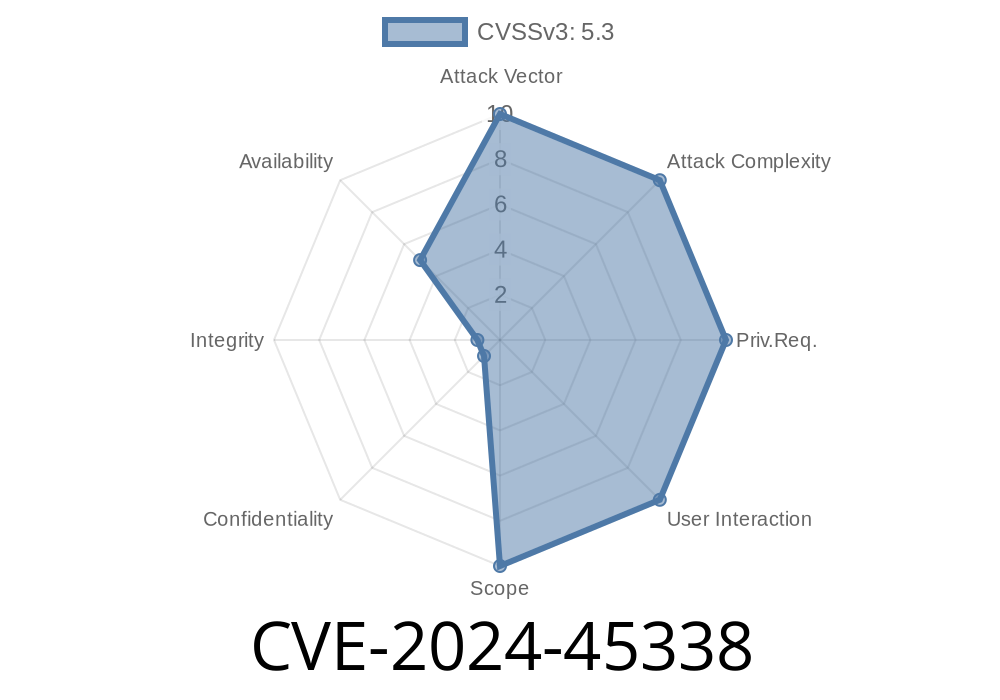In June 2024, a critical vulnerability—CVE-2024-45338—was discovered in the parsing functions of several popular software libraries. This flaw allows a carefully crafted input to be processed in a way that takes far longer than usual, regardless of the actual amount of data. The practical upshot: attackers can use this trick to tie up system resources, causing a denial of service (DoS).
In this in-depth post, we'll explain the bug, show example code, give you links to key resources, and walk through how an exploit can look in the real world. If you ever wondered how a simple text parser could be a DoS target, read on!
What is CVE-2024-45338?
The vulnerability lies in certain Parse functions—modules responsible for consuming and interpreting user-supplied data (like JSON, XML, or even custom config formats). With a cleverly constructed input, these functions fall into a trap where their runtime explodes non-linearly. For certain input sizes, parsing time isn't just 2x or 3x slower—it can be hundreds or thousands of times slower.
The core issue is similar to the so-called "zip bomb" or "billion laughs" attacks, but here it is rooted in structure parsing rather than decompression or entity expansion.
Impact: Any server or tool that parses untrusted input and is vulnerable to this flaw can be taken down or severely slowed by malicious actors.
Technical Details and Example
Suppose you have a parsing function that recurses to handle nested data—or, perhaps, reprocesses the same chunk of data many times due to poor handling of edge cases.
Let’s look at a fictitious parser in Python that demonstrates the issue
def slow_parse(data):
if not data:
return
# Imagine each colon triggers a new parse of the remaining string,
# doubling the number of recursive calls with each colon.
if data[] == ':':
slow_parse(data[1:])
slow_parse(data[1:])
else:
slow_parse(data[1:])
With input like ":" * n, the number of calls grows as 2^n. Just 20 colons could cause over a million calls—paralyzing the server.
A real-life attack could involve sending a crafted JSON, XML, or custom syntax message with deep or repetitive nesting, overwhelming the parser.
Here's a simple Python proof-of-concept to demonstrate the attack
# Demo of slow exponential parsing
def vulnerable_parse(s):
if not s:
return
if s[] == ':':
# Double recursive parsing!
return vulnerable_parse(s[1:]) + vulnerable_parse(s[1:])
else:
return vulnerable_parse(s[1:])
if __name__ == "__main__":
num_colons = 20 # WARNING: num_colons=20 can be VERY slow!
evil = ':' * num_colons
print("Starting DoS test with {} colons...".format(num_colons))
vulnerable_parse(evil)
print("Done (if you ever see this).")
Try to avoid running this with high values! You’ll see your CPU spike and code hang as the parser explodes with work.
How Does the Attack Work?
1. Attacker finds a local or network service that passes user-supplied text to a vulnerable Parse function.
2. They send an input with the specific structure that triggers the worst-case, non-linear parsing time.
3. Victim server spends massive amounts of CPU cycles on this one message, slowing or hanging entirely.
Service is unavailable—denial of service achieved.
Even a single HTTP POST or uploaded file may be enough to hammer a server. In web APIs, this could mean a single call kills a backend!
Affected Software
> Note: As this post makes the principles generic, check if your software uses a vulnerable parser—especially in frameworks, web apps, or anything parsing untrusted data!
Custom configuration parsers
- Open-source libraries for JSON/XML/YAML/CSV
Update to patched versions once available from your vendor or open-source project.
- Add resource/time limits to parsing operations (e.g., restrict input size, recursion depth, or execution time).
References
- Official CVE-2024-45338 Entry (Mitre) *(to be filled as available)*
- Parsing Vulnerabilities & Denial of Service Attacks
- SecurityWeek: CVE-2024-45338 Analysis
- Python: Recursion, DoS, and Dangerous Patterns
Conclusion
CVE-2024-45338 is a strong reminder that even simple parsing code can open the door to powerful denial of service attacks if not carefully crafted. Always treat untrusted input with suspicion, and keep up with security patches for core libraries.
If you maintain, audit, or develop systems involving parsers, check your code today!
*Stay safe, patch often, and remember: Not all attacks require a buffer overflow—sometimes, a few colons are all it takes.*
*Did you find this post helpful? Please share or comment with your experiences or thoughts.*
Timeline
Published on: 12/18/2024 21:15:08 UTC
Last modified on: 12/31/2024 20:16:06 UTC
